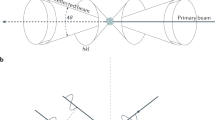Abstract
FOR several years it has seemed to us to be of interest to repeat the oil-drop method in order that this method may have an opportunity of contributing to the building up of the new value of the electronic charge, which is now going on. The only existing prototype, the famous oil-drop experiments of Millikan in 1913 and 1916, seems to predict an internal consistency somewhat less than that of the new spectroscopic X-ray and electron-wave1 methods. The first step in this direction was taken by Kellström2 when he re-measured the value of the viscosity of air (), which is fundamental for this method.
This is a preview of subscription content, access via your institution
Access options
Subscribe to this journal
Receive 51 print issues and online access
$199.00 per year
only $3.90 per issue
Buy this article
- Purchase on Springer Link
- Instant access to full article PDF
Prices may be subject to local taxes which are calculated during checkout
Similar content being viewed by others
References
Sten von Friesen, Uppsala Univ. Årskr., 14 (1935).
Gunnar Kellström, NATURE, 136, 682 (1935).
Wien, Harms, ” Handb. Exp. Phys..”, IV, 4, 523 (1932).
Author information
Authors and Affiliations
Rights and permissions
About this article
Cite this article
BÄCKLIN, E., FLEMBERG, H. The Oil-Drop Method and the Electronic Charge. Nature 137, 655–656 (1936). https://doi.org/10.1038/137655b0
Issue Date:
DOI: https://doi.org/10.1038/137655b0
This article is cited by
-
A survey of atomic constants
Il Nuovo Cimento (1957)
-
The Oil-Drop Method for the Determination of the Electronic Charge
Nature (1949)
-
Determination of the Electronic Charge by the Oil-Drop Method
Nature (1946)
-
The Electronic Charge
Nature (1940)
-
Viscosity of Air and the Electronic Charge
Nature (1938)
Comments
By submitting a comment you agree to abide by our Terms and Community Guidelines. If you find something abusive or that does not comply with our terms or guidelines please flag it as inappropriate.



